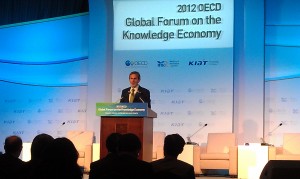A PROCLAMATION
America is known around the world as a country that empowers the inventor and the innovator. Ours is a Nation where men and women can take a chance on a dream — where they can take an idea that starts around a kitchen table or in a garage and turn it into a new business or a new industry. During National Entrepreneurship Month, we celebrate the hard work, ingenuity, and courage of our thinkers, doers, and makers.
Because the new businesses created by entrepreneurs are responsible for most of the new jobs in our country, helping them succeed is essential to helping our economy grow. That is why my Administration has fought tirelessly to invest in entrepreneurs and small businesses so they can do what they do best — take risks, develop new ideas, grow businesses, and create new jobs. To help them expand and hire, I have signed 18 tax cuts for small businesses into law. Last year, my Administration launched the Startup America initiative to help connect innovators to funding and mentorship, cut through red tape, speed up innovation, and get their ventures off the ground faster. Alongside it, leaders in the private sector launched the Startup America Partnership, which has made over $1 billion in business services available to a national network that will serve tens of thousands of startups over the next 3 years. I also directed Federal agencies to streamline processes for establishing public-private research partnerships, small business research and development grants, and university-startup collaborations. And we launched BusinessUSA, a virtual one-stop shop that helps businesses — large and small — access the full range of Federal resources they need at every stage of their development.
My Administration has continued to build on that progress in 2012. Earlier this year, I signed the Jumpstart Our Business Startups (JOBS) Act into law, which is making it easier for innovative companies to go public and expand their workforce. For the first time, the law will also allow ordinary Americans to go online and invest in the startups and small businesses they believe in through crowdfunding platforms. We have also updated regulations to make it easier for foundations to invest in businesses pursuing charitable purposes and stronger communities. In August, we launched the Presidential Innovation Fellows program to bring top innovators outside of Government together with top innovators inside Government; release Federal data that is being used to develop new products, services, and businesses; make it easier for startup entrepreneurs to compete
for Government contracts; transform the way citizens access Government information and services; and save taxpayers money. In addition, thousands of American entrepreneurs and inventors are helping Federal agencies solve tough problems at www.Challenge.gov. And, as part of the Middle Class Tax Relief and Job Creation Act I signed in February, we have bolstered Self-Employment Assistance programs that allow States to empower unemployed workers to start their own businesses.
As long as America’s daring entrepreneurs are taking risks and putting themselves behind new ideas and innovations, the Federal Government will serve as a partner to support their endeavors and catalyze their success. This month, and during Global Entrepreneurship Week, let us renew the spirit of innovation that has fueled more than two centuries of American progress and promises to drive us in the years to come.
NOW, THEREFORE, I, BARACK OBAMA, President of the United States of America, by virtue of the authority vested in me by the Constitution and the laws of the United States, do hereby proclaim November 2012 as National Entrepreneurship Month. I call upon all Americans to commemorate this month with appropriate programs and activities, and to celebrate November 16, 2012, as National Entrepreneurs’ Day.
IN WITNESS WHEREOF, I have hereunto set my hand this first day of November, in the year of our Lord two thousand twelve, and of the Independence of the United States of America the two hundred and thirty-seventh.
BARACK OBAMA
